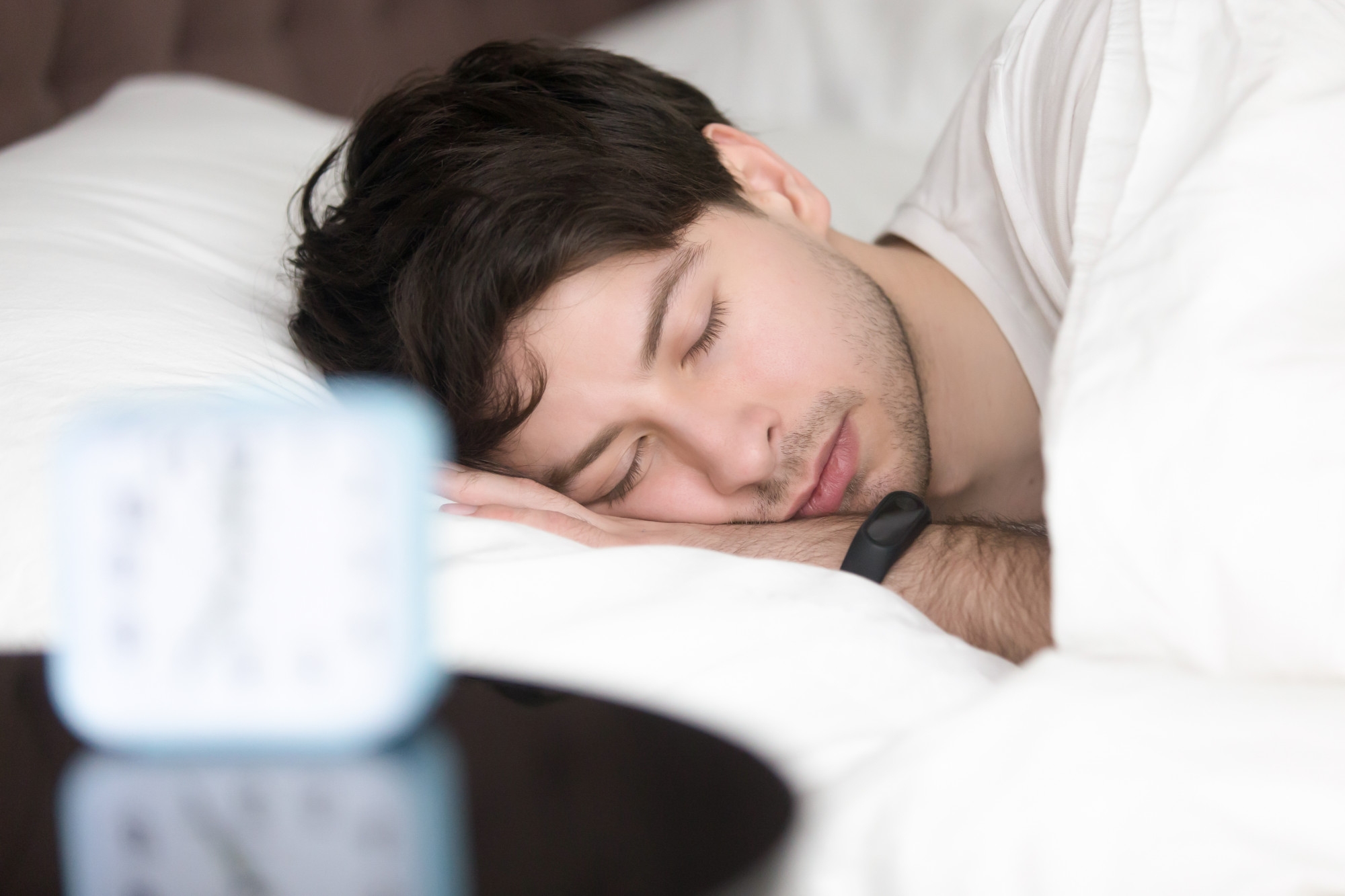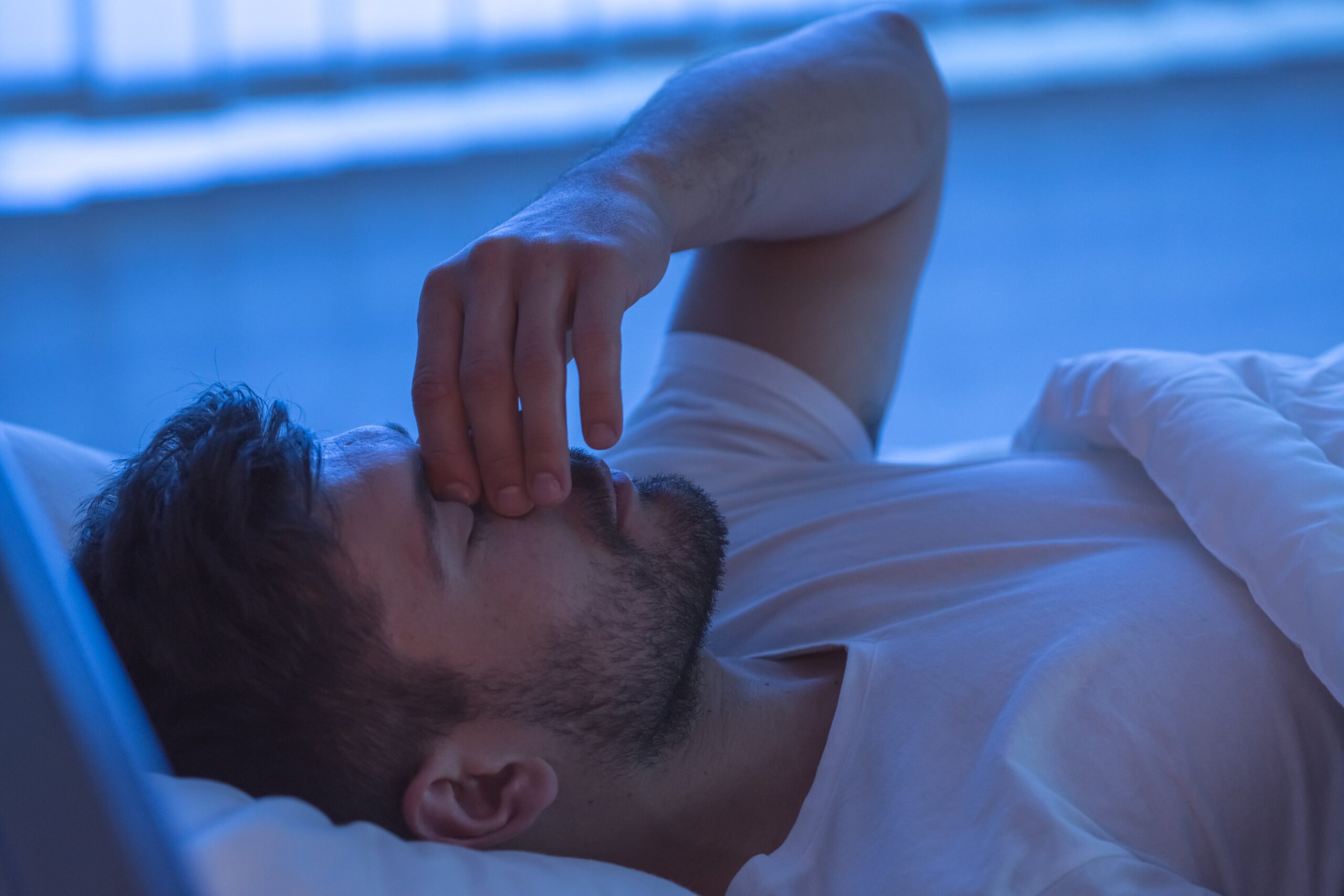
If you’re waking up tired, groggy, or just not yourself—even after spending the recommended 8-9 hours in bed—you may be dealing with more than just poor sleep. Sleep apnea and low testosterone frequently occur together, and they can create a frustrating health cycle that’s hard to break without targeted intervention.
In this article, we’ll explore how sleep apnea impacts testosterone, how low testosterone contributes to sleep problems and worsens apnea, and most importantly, what you can do to break this cycle and reclaim your energy, vitality, and sleep.
How Sleep Apnea Reduces Testosterone
Obstructive sleep apnea (OSA) causes your airway to become partially or completely blocked during sleep. This disrupts your breathing, causes frequent awakenings—even if you don’t remember them—and interferes with the critical stages of restorative sleep. (1)
Poor REM Sleep, Poor Hormone Production
Most of a man’s daily testosterone is produced overnight, particularly during REM sleep. Studies have shown the highest levels occur after a full night of sleep at around 8 a.m. (2)
When REM sleep is interrupted, as it is frequently with sleep apnea, testosterone production drops. Over time, this disruption can lead to chronically low levels of testosterone, even in otherwise healthy men. One study showed that men who spent a week sleeping five or fewer hours per night saw a 10-15% drop in overall testosterone levels. (3)
Oxygen Deprivation Disrupts Hormonal Balance
When your oxygen levels dip repeatedly throughout the night, your body perceives this as a stress event. In response, it ramps up cortisol (the stress hormone), which has an inverse relationship with testosterone. Elevated cortisol suppresses natural testosterone production, throwing off your hormonal balance and setting the stage for fatigue, low mood, and poor recovery. (4)
Long-Term Sleep Fragmentation Causes Hormone Decline
Over months or years, this cycle becomes deeply ingrained. If you’re struggling with low testosterone sleep problems—such as waking up groggy, having trouble falling asleep, or experiencing low libido and poor mood—it might be time to consider whether undiagnosed sleep apnea is playing a role.
How Low Testosterone Worsens Sleep Apnea
The relationship between low T and sleep apnea isn’t one-directional. Low testosterone can actually increase your risk of developing or worsening existing sleep apnea symptoms in men, particularly those over 40. (5)
Weight Gain and Fat Accumulation Around the Neck
One of the hallmark symptoms of Low T is unwanted weight gain, particularly increased fat around the midsection and neck. This added tissue can press against your airway, especially when lying down, making it harder to breathe at night and increasing the chances of airway collapse.
Decreased Muscle Tone in the Airway
Testosterone plays a vital role in muscle maintenance, including the muscles that help keep your airway open at night. When testosterone levels drop, muscle tone in the throat and tongue weakens, increasing the likelihood of partial or complete airway obstruction.
Low Energy and Depression Reduce Activity
Low testosterone has also been linked with reduced physical activity and increased depressive symptoms. (6) This drop in energy and motivation makes it harder to stick with healthy habits like exercise and weight control—both of which are important for managing sleep apnea. As a result, low T and sleep apnea reinforce each other in a damaging loop.
Signs You’re Stuck in the Sleep-Hormone Vicious Cycle
Many men overlook the link between hormones and sleep. It’s not always easy to tell whether your symptoms are from sleep apnea, low testosterone, or both. However, the overlap between the two can create a distinct pattern. If you’re experiencing several of these symptoms, it may be time to get evaluated for sleep apnea and low T.
- Loud snoring, choking, or gasping during sleep
- Daytime sleepiness, brain fog, and lack of motivation
- Weight gain, especially around the belly
- Low libido, erectile dysfunction, and mood swings
Men with sleep apnea symptoms often don’t realize their testosterone levels are suffering—and vice versa. But when these signs appear together, they may point to an underlying cycle that needs to be addressed on both fronts.
How to Break the Cycle: Practical Solutions
Left untreated, sleep apnea and low testosterone feed into each other—sapping your energy, disrupting your mood, and draining your health. Addressing both conditions at once is the key to lasting improvement.
Start by getting a sleep study—either at home or in a lab—to find out if you’re dealing with obstructive sleep apnea. This will help confirm if you have obstructive sleep apnea and determine its severity. From there, treatments like CPAP (Continuous Positive Airway Pressure) can significantly improve oxygen flow, restore proper REM sleep, and support healthier testosterone levels naturally.
Additionally, small lifestyle adjustments can make a big difference. Prioritizing weight loss—especially if you carry extra fat around your neck or abdomen—can reduce airway blockage and improve hormone balance. Regular exercise is also key, as it not only helps control body fat but also boosts testosterone production and reduces sleep disruptions.
Managing stress is just as critical; high cortisol levels from chronic stress can suppress testosterone and make sleep problems worse. A consistent sleep schedule, good sleep hygiene, and limiting alcohol or sedative use at night can all contribute to deeper, more restorative rest. (7)
It’s also important to consider hormone testing. If you’re experiencing common symptoms like fatigue, low libido, brain fog, or mood changes, your testosterone levels might be playing a bigger role than you think.
For men with confirmed low testosterone, testosterone replacement therapy for sleep apnea-related symptoms may be part of the solution.
While testosterone therapy doesn’t directly cause sleep apnea, studies suggest that in some men, especially those with untreated severe OSA, it can worsen breathing disruptions during sleep. That’s why sometimes a sleep study is recommended before starting TRT if symptoms of apnea are present.
Gameday Men’s Health offers fast, accurate testosterone testing to help identify hormone imbalances early and offer clear next steps to improve your overall health.
Sleep and Hormones: Why Breaking the Cycle Matters
Left unchecked, sleep apnea and low testosterone create a destructive feedback loop that drains your energy, disrupts your mood, and affects nearly every aspect of your health. The good news is that breaking the cycle can unlock the potential for real, substantial change.
By improving your sleep, balancing your hormones, and adopting a healthier lifestyle, you can regain energy and motivation, sleep better, and wake up refreshed. It can also help you improve your physique and confidence and feel more connected in your relationships.
Don’t wait for the symptoms to get worse. If you believe there is a connection between your sleep and testosterone, get tested, explore your treatment options, and take the first step toward breaking the cycle—for better sleep, stronger hormones, and a better life.
How Gameday Men’s Health Can Help You Break the Cycle
At Gameday Men’s Health, we take a personalized, science-backed approach to optimizing men’s wellness. Our clinics are designed for comfort, discretion, and efficiency—helping you get the care you need without the hassle.
Here’s what sets us apart:
- Customized Hormone Evaluations and TRT Plans: We don’t guess what the best treatment is or deliver a one-size-fits-all solution. We test your hormone levels and tailor your treatment to your body’s exact needs.
- Men’s Health Expertise: We focus solely on men’s wellness, with services designed to enhance energy, performance, and longevity.
- Whole-Health Approach: From sleep quality to sexual health to vitamin injections, our goal is to help you feel like your best self again.
- Convenient Locations Nationwide: Gameday clinics are available across the U.S., making it easy to get started no matter where you are.
Feeling tired and frustrated? Break the cycle. Schedule your free consultation today.
References
- Sleep Apnea
- How Does Testosterone Affect Sleep?
- Effect of 1 Week of Sleep Restriction on Testosterone Levels in Young Healthy Men
- Serum testosterone/cortisol ratio in people with obstructive sleep apnea
- Sleep Apnea and Testosterone: Uncovering the Connection
- Men with ‘low testosterone’ have higher rates of depression
- Get Enough Sleep






